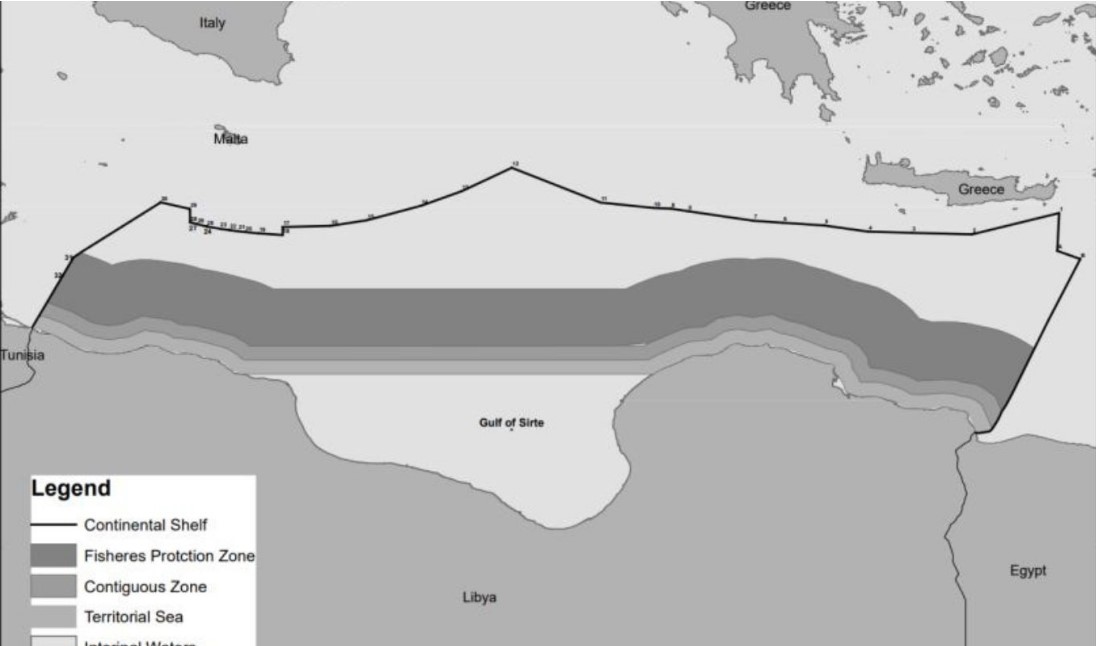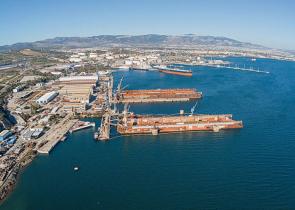In a provocative move with clear guidance from Turkey, Libya proceeded to submit a verbal note to the UN on May 27, with a publication date of July 1, presenting the external limits of its continental shelf, essentially “erasing” Crete and rejecting all of Greece’s moves on the “chessboard” of the Eastern Mediterranean, as well as any logical application of International Law of the Sea.
This move actually precedes chronologically the verbal note that was published earlier this month (note: submitted on June 20), based on which Tripoli disputed the median line that Greece has defined and based on which hydrocarbon exploration blocks have been demarcated, both west and south of Crete. The publication of the Libyan verbal note comes just 24 hours after Giorgos Gerapetritis’ visit to the African country’s capital.
Libya’s new move follows Turkey’s template and resembles adoption of the provocative “Blue Homeland” logic, with Ankara in 2020 having also unilaterally submitted its own claims, based on the Turkish-Libyan Memorandum, ignoring the sovereign rights of Greece and Cyprus in the Eastern Mediterranean.
Libya:
- Rejects as illegal the partial EEZ delimitation between Greece and Egypt.
- Disputes the proclamation of the Greek EEZ in the Ionian Sea (Government Gazette April 18, 2025).
- Rejects the Greek Maritime Spatial Planning.
- Condemns hydrocarbon exploration in Greek blocks southeast of Crete and demands suspension of all research by Greece and Egypt.
According to the document, Libya adopts Turkish argumentation about reduced or zero effect of islands on maritime zones and requests that Libyan internal legislation and the “closure” of the Gulf of Sirte be taken into account. Libya’s intention for dialogue, as mentioned in the note (invoking Article 33 of the UN Charter), is accompanied by the demand for acceptance of the Turkish-Libyan Memorandum as a starting point, a fact that nullifies any prospect of substantial negotiation.

Invoking the Turkish-Libyan memorandum
Specifically, the Tripoli government, invoking previous Libyan letters to the United Nations, presents its own Maritime Spatial Planning by invoking the Turkish-Libyan memorandum. It considers the Greece-Egypt delimitation invalid and illegal and condemns Greece’s Maritime Spatial Planning as violating Libya’s maritime jurisdictions in the Mediterranean. Libya ignores Crete, following the same pattern as the Turkish-Libyan memorandum, based on the theory that islands are not entitled to continental shelf and Exclusive Economic Zone.
The appendix to Libya’s Maritime Spatial Planning submitted to the UN characteristically states:
“First, Libya and Turkey signed a memorandum of understanding on November 27, 2019, for the delimitation of maritime jurisdiction areas in the Mediterranean Sea. The said Memorandum of Understanding was duly deposited with the UN Secretariat in accordance with Article 102 of the Charter on December 11, 2019, and constitutes a fair solution achieved based on international law. Neither Greece nor Egypt are entitled to sovereign rights in the maritime areas delimited between Libya and Turkey according to international law“.
“Invalid” Greece-Egypt delimitation
“Second, Libya considers the 2020 Agreement on the delimitation of exclusive economic zones between Greece and Egypt to be null and void, as it does not comply with international law, including the United Nations Convention on the Law of the Sea, particularly with the principle of equity. Greece and Egypt’s attempts to define and license hydrocarbon exploration areas respectively in 2014 and 2021, and most recently, in April 2024, Greece’s approval for hydrocarbon exploration south of Crete violates Libya’s sovereign rights in the Mediterranean Sea“.
“Libya’s sovereign rights ignored”
“Specifically, Greece continues unilateral research and drilling activities in the said so-called offshore licensing areas from November 26, 2022, completely ignoring Libya’s sovereign rights and seriously violating established rules and practices of international law, including the UN Convention on the Law of the Sea, regarding continental shelf delimitation between states with opposite coasts.
Third, certain areas of Greece’s Maritime Spatial Plan (MSP), as declared by Greece’s Ministry of Foreign Affairs and Ministry of Environment and Energy, dated April 16, 2025, violate Libya’s maritime jurisdictions in the Mediterranean Sea. Specifically, certain areas in the southern part of the Greek MSP map violate Libya’s continental shelf in the Mediterranean Sea, where Libya has ipso facto and ab initio sovereign rights and jurisdiction according to international law.
Fourth, Greece declared an exclusive economic zone (EEZ) in the Ionian Sea on April 17, 2025, with Government Gazette No. 59 of the same date, which encroaches on Libya’s continental shelf, where Libya has ipso facto and ab initio sovereign rights and jurisdiction according to international law. The southern borders of the unilaterally proclaimed Greek EEZ are not equidistant from Libya’s and Greece’s continental coasts. Therefore, the southern part of the proclaimed Greek EEZ in the Ionian Sea is illegal to the extent that it ignores Libya’s sovereign rights in the relevant maritime area and violates Libya’s continental shelf in the Mediterranean Sea.
As is known, relevant international law encourages states to make every effort to enter into provisional arrangements of a practical nature and not to jeopardize or hamper the achievement of the final agreement on continental shelf and EEZ delimitation. Therefore, the unilateral proclamation of the Greek EEZ in the Ionian Sea, in violation of the Libyan continental shelf, contravenes established principles of international law of the sea“.
“Greece’s claims are maximalist and illegal”
Libya “fully rejects the illegal and maximalist maritime boundary claims of Greece and Egypt, as well as the offshore areas they have licensed in the Mediterranean Sea, based on these claims. Libya reserves all its legitimate rights over maritime areas, including the seabed, subsoil and superjacent waters to which they are connected, arising from international law“.
In its verbal note, the Tripoli government notes that “the maritime boundary between Libya and Egypt is depicted according to the verbal note from Libya’s Permanent Mission to the United Nations dated February 13, 2023, to the UN Secretary-General, with which the eastern limits of Libya’s maritime jurisdictions were deposited with the United Nations“.
Libya calls on Greece and Egypt to suspend exploration licenses
In the same spirit, Libya also calls on Egypt and Greece to suspend all licenses and hydrocarbon exploration activities in the said areas until all maritime boundary disputes are resolved through negotiations between the interested parties and with valid agreements according to international law.
Libya’s verbal note “produces no legal effects“, diplomatic sources emphasize regarding the document submitted by Libya’s Permanent Mission to the United Nations. They also add that these positions “have been raised in the past and properly answered by Greece and Egypt“.
ExxonMobil announces new natural gas discovery in Cyprus EEZ
Greek PM says all NATO members should commit to defence spending target
Ακολουθήστε το Lykavitos.gr στο Google News
και μάθετε πρώτοι όλες τις ειδήσεις



